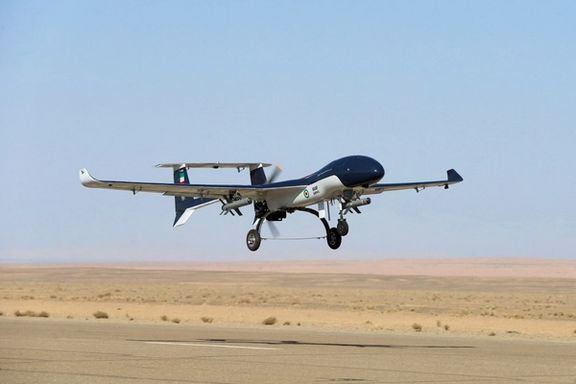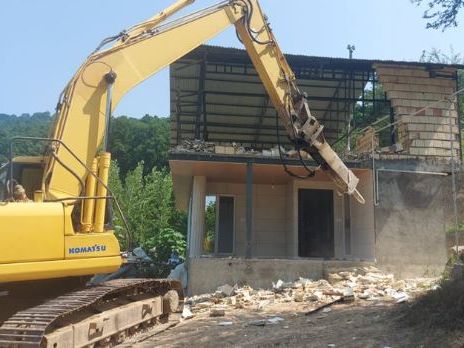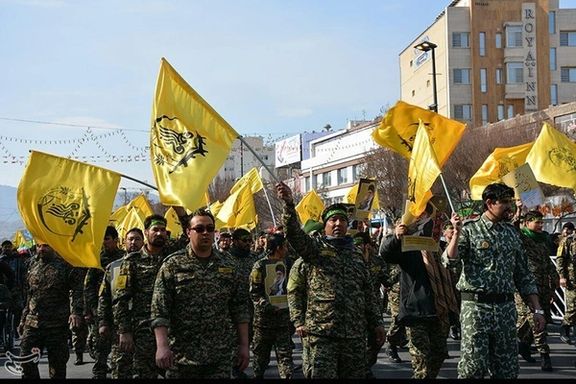Israeli F-35s Repeatedly Penetrated Iran’s Airspace – Report

Israeli Air Force F-35 stealth fighters have repeatedly entered Iranian airspace in the past two months, according to a report by a Saudi media outlet.

Israeli Air Force F-35 stealth fighters have repeatedly entered Iranian airspace in the past two months, according to a report by a Saudi media outlet.
The unverified report from London-based independent Arabic online newspaper Elaph said that the jets managed to evade Russian and Iranian radar during the drills, adding that Israel and the United States also carried out secret exercises over the Red Sea.
The purpose of the operations -- conducted with the US – was to simulate an aerial and maritime strike on Iran in the Red Sea as well as the seizure of Iranian warships in the Persian Gulf.
Israel has been preparing its air force – chiefly its F-35s – for possibly attacking Iran’s nuclear facilities. It has been specifically upgrading the jets so that they would not require mid-air refueling.The country's air force has also integrated a new one-ton bomb into the arsenal of weapons used by the F-35s (known in the IAF as the “Adir”) that can be carried inside the plane’s internal weapons compartment without jeopardizing its stealth radar signature.
The report comes as the United States and its allies are inching closer to an agreement over the revival of the 2015 nuclear deal with Iran, which Israel strongly opposes.
Israel’s Prime minister Yair Lapid on Wednesday condemned the deal, saying that the Jewish state "will act to prevent Iran from becoming a nuclear state.”
On Monday, Amirali Hajizadeh, the commander of Iran's Revolutionary Guard’s Aerospace Force, threatened that Tehran could "destroy” Israel, even without nuclear weapons.”

Unconfirmed reports are circulating in social media about the escape of a political prisoner, who used to work as an official of Iran’s Presidential Administration, from Tehran’s Evin prison.
Attorney Mohammad Moghimi said on Twitter on Wednesday that his former client Farhad Salmanpour Zahir has managed to "escape" from the prison.
“In a bold and clever move, he escaped from Evin prison with a very complex, technical, and stylish act after misleading” intelligence officers -- Moghimi said.
Salmanpour, who worked at the president's office under Mahmoud Ahmadinejad, was detained on August 21, 2019, by the intelligence ministry agents without any arrest warrant and was taken to Evin’s 209 ward, where he spent 45 days in solitary confinement. He had been imprisoned many times by the security agencies during the past years.
About two months later, human rights sources reported that Salmanpour was subjected to the most severe torture in order to obtain a forced confession about his relationship with Ruhollah Zam, a dissident journalist who was the director of the Amadnews Telegram channel before he was abducted in Iraq in 2019, and taken to Iran and hanged.
He reportedly faced new charges for informing about the suspicious death of another prisoner, Shahin Naseri.

Several US Republicans have expressed their concerns about the apparently imminent agreement with Iran to revive the 2015 nuclear accord.
Texas Senator Ted Cruz said on Tuesday that "This deal will quickly flood the regime with hundreds of billions of dollars and soon afterwards the deal will be worth trillions. It will dismantle sanctions on Iran economy, which is controlled by IRGC, and provides IRGC with resources it needs to export its terror globally."
He said that “the Iranian regime violated the last nuclear deal, violated their most fundamental nuclear obligations beyond the deal, and violated international norms against nuclear proliferation. This deal will excuse Iran from that previous cheating, while enabling it to continue into the future.”
Reiterating his intention “to systemically fight the implementation of this catastrophic deal” Cruz added that he “will work with my colleagues to ensure that is blocked and eventually reversed in January 2025," referring to the date the next US administration assumes office. "A year ago, Biden gave Afghanistan to the Taliban. Now he intends to give a nuclear arsenal to Iran. The details of this deal are only now emerging, but we already know they'll be catastrophic to the national security of the US and allies and to the safety of Americans."
Expressing concern over a lack of recent engagement with Congress on reviving the JCPOA, Texas Representative Michael McCaul wrote to President Joe Biden to demand that Congress be given a chance to review any agreement to revive JCPOA.
Indiana's representative Jim Banks said, “Biden can't stop Congress nor a future GOP admin from reimposing Iran sanctions.” “If Iran is looking for 'guarantees,' I guarantee conservatives will work to reverse any of Biden's sanctions relief.”

Iran’s Army has started a large-scale drone drill, featuring its reconnaissance and combat drones in the Persian Gulf and the Sea of Oman, as well as over its territory.
Vice Admiral Mahmoud Mousavi, the deputy of Army Operations and Spokesman for the Army's 1401 joint drone exercise said on Wednesday that surveillance drones operated by the four units of the Army, namely the Ground Force, Navy, Air Force and Air Defense Force, successfully carried out their intelligence-gathering and patrol missions on the first day of the two-day drill.
In addition to Mohajer-6 ISTAR (intelligence, surveillance, target acquisition, and reconnaissance) aircraft, various Iranian-made drones such as Yasir, Sadeq, Yazdan and Ababil-3 tactical surveillance unmanned aerial vehicles as well as Pelican vertical takeoff and landing (VTOL) naval drone were flown from different bases across the country, he said, adding that the aircraft successfully identified designated targets in the general zone of the exercise as well as international waters.
The Army has as set up a command-and-control network for the drone operations to expand unmanned aerial capabilities, execute drone missions and coordinate such flights, Mousavi said, boasting that “This exercise exhibits only a small fraction of the achievements made by the Islamic Republic of Iran Army regarding domestically-developed drones.”
Deputy Chief of the Iranian Army for Coordination Rear Admiral Habibollah Sayyari said on Tuesday that more than 150 new advanced drones will be flown in the drill.
Earlier in the month, Iran’s Revolutionary Guard confirmed that it held joint drone exercises with Russia at the Kashan Air Base, adding that Belarus and Armenia are also partaking in the drills.

UN experts and Amnesty International have expressed deep concern over Iran’s persecution of Baha’is and urged an end to pressure on religious and other minorities.
“We are deeply concerned at the increasing arbitrary arrests, and on occasions, enforced disappearances of members of the Baha’i faith and the destruction or confiscation of their properties, in what bears all the signs of a policy of systematic persecution,” the experts said in a statement Monday.
The Shia clergy consider the Baha’i faith as a heretical sect. Supreme Leader Ali Khamenei has on several occasions called the Baha'i faith a cult and in a religious fatwa in 2018 forbade contact, including business dealings, with followers of the faith.
Bahai’s, who number around 300,000 in Iran, cannot hold jobs in the public sector and are sometimes sacked from their jobs in the private sector under pressure from authorities. They are also deprived from higher education.
Followers of the Baha'i faith say the Islamic Republic has taken its systematic campaign to a higher level in the past few months. Earlier this month Security forces laid siege to a village in northern Iran and demolished houses and farms belonging to members of the persecuted faith.
Security forces have also arrested tens of Baha'is including Mahvash Sabet, Afif Naimi, and Fariba Kamalabadi, three former leaders of the community, and shut down businesses.
The intelligence ministry claimed on August 2 that the detained Baha’is were linked to the Baha’i Universal House of Justice in Haifa, Israel, and had collected information in Iran and conveyed it to their headquarters, implying that such information would be shared with Israel. The Universal House of Justice is the nine-member supreme ruling body of the Bahaʼi Faith.
Signatories of the statement including Javaid Rehman, Special Rapporteur on the situation of human rights in Iran, Fernand de Varennes, Special Rapporteur on Minorities Issues, Nazila Ghanea, Special Rapporteur on freedom of religion, as well as several members of the Working Group on Enforced or Involuntary Disappearances added in their statementthat the acts against Baha’is formed part of a “broader policy to target any dissenting belief or religious practice, including Christian converts, Gonabadi dervishes and atheists.”
“The international community cannot remain silent while Iranian authorities use overbroad and vague national security and espionage charges to silence religious minorities or people with dissenting opinions, remove them from their homes and effectively force them into internal displacement,” the experts said.
Amnesty International launched an urgent appeal regarding the escalation of attacks on Baha’is human rights Tuesday, urging national chapters and concerned individuals to write to three Iranian officials including Chief Justice Gholamhossein Mohseni Ejeiand urge them. to “immediately and unconditionally release” all the Baha’is recently detained as well as those in prison from before and “quash all convictions and sentences imposed on this basis.”
Amnesty’s appeal said detainedBaha’is are targeted solely for the peaceful exercise of their right to freedom of religion and called on authorities to end discrimination against the community in law and in practice, including in access to employment, housing, and agricultural, industrial, trade and other activities necessary for the enjoyment of social, economic and cultural rights.
For decades Iran has not allowed visits to any of the fourteen UN human rights experts who have made requests to monitor the situation of human rights.

The US military carried out air strikes on Tuesday in Syria against facilities used by groups affiliated with Iran's Revolutionary Guards Corps (IRGC).
The strikes in Deir al-Zor area came even as the United States aimed to respond to a draft agreement proposed by the European Union that would bring back the 2015 nuclear deal with Iran that former President Donald Trump abandoned, and current President Joe Biden has sought to revive.
The military's Central Command said in a statement that such strikes were aimed at protecting US forces from attack by Iran-backed groups.
Iran has so far not commented on the attack and government-controlled media did not report the development on Wednesday.
It cited one such incident on Aug. 15, which Reuters has reported involved drone attack on a compound run by coalition and US-backed Syrian opposition fighters, with no casualties.
Reports say the US will likely respond to the EU proposal on the nuclear talks on Wednesday, most probably followed by more indirect negotiations with Iran to resolve all differences.
The agreement is strictly about restricting Iran’s nuclear program in exchange for US sanctions relief and does not cover other issues, such as Iran’s aggressive activities in the region or its missile program.
The Biden Administration has refused to lift sanctions imposed in 2019 on the IRGC for its “malign activities” and support for proxy groups in the Middle East as part of the nuclear deal.
"The president gave the direction for these strikes," said spokesman Army Colonel Joe Buccino.
Central Command called the strikes a "proportionate, deliberate action intended to limit the risk of escalation and minimize the risk of casualties."
The statement about Tuesday's US strike did not mention whether there were any casualties and did not say whether the air strikes were carried out by manned or unmanned aircraft.
This is not the first time US warplanes have struck Iran-backed forces in Iraq and Syria. The United States hit operational and weapons storage facilities at two locations in Syria and one in Iraq in June last year.
US forces first deployed into Syria during the Obama's administration's campaign against Islamic State, partnering with a Kurdish-led group called the Syrian Democratic Forces. There are about 900 U.S. troops in Syria, most of them in the east.
But Iran-backed militias established a foothold in Syria while fighting in support of President Bashar al-Assad during Syria's civil war.
Iranian-backed militias are heavily concentrated west of the Euphrates in Deir al-Zor province, where they get supplies from Iraq through the al-Bukamal border crossing.
Israel, which strongly oppose the Iranian presence in Syria, has launched hundreds of airstrikes against Iranian positions and those of its allies in Syria.
An IRGC general was killed in Syria last week, reportedly in the latest airstrike carried out against Iranian bases.
With reporting by Reuters